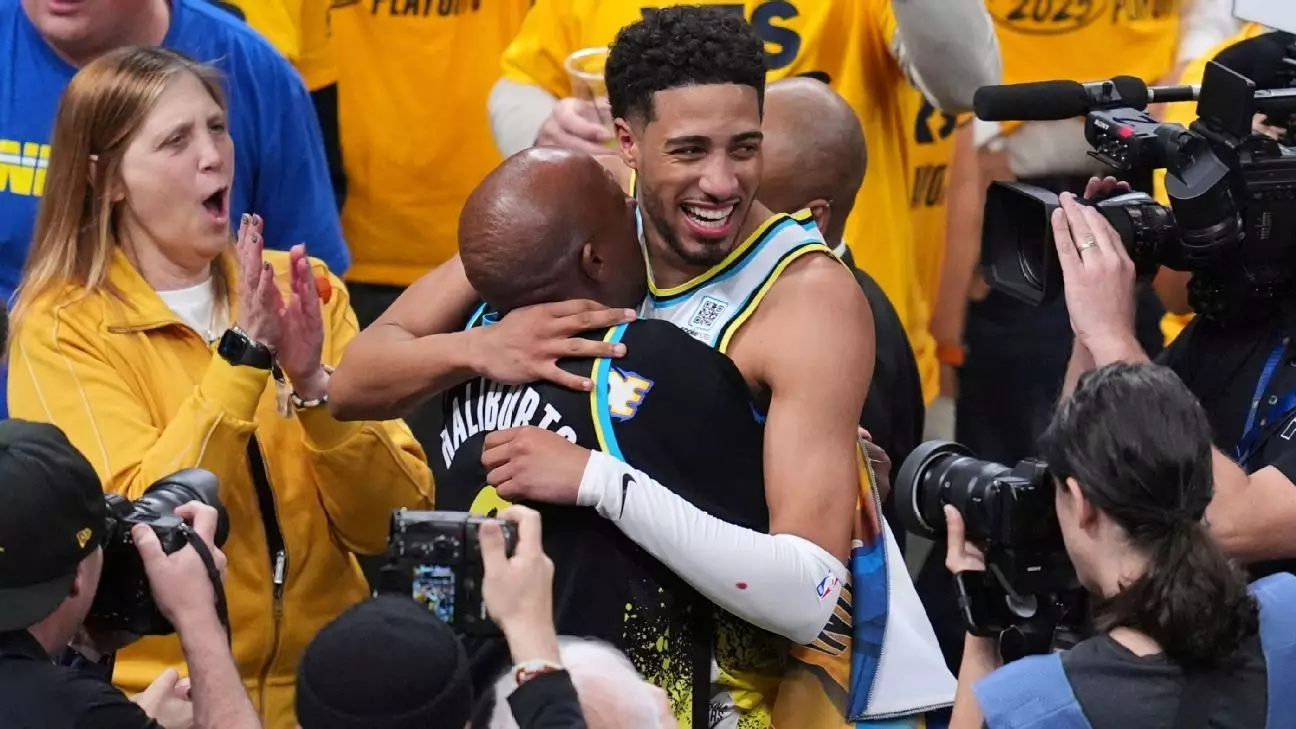Empathy in Sports: The Unfolding Drama of Family and Respect
In the fast-paced and adrenaline-fueled world of professional basketball, the spotlight often illuminates not just the athletes but also their families. Recently, an incident involving John Haliburton, father of Indiana Pacers star Tyrese Haliburton, highlighted how emotions can quickly become heated in such competitive environments. This particular event reached a climax during a tense encounter with Milwaukee Bucks’ superstar Giannis Antetokounmpo, prompting fans and commentators alike to reflect on where the line is drawn between family pride and sportsmanship.
John’s intense confrontation with Antetokounmpo came after a thrilling buzzer-beater secured his son’s victory, drawing significant attention. In his emotional fervor, John embodied the passionate instincts many fans experience: a deep desire to protect and celebrate their family’s achievements. However, this instinct swiftly morphed into a disrespectful altercation, forcing the Pacers’ management to step in decisively. This incident serves as a stark reminder of how quickly emotions can spiral out of control if not kept in check.
Key Takeaways
- The incident sheds light on the fine balance between familial pride and maintaining sportsmanship.
- John Haliburton’s actions led to significant consequences, reflecting the importance of responsibility.
- This episode provides a broader lesson on empathy and respect in high-pressure sports environments.
Consequences of Actions: A Lesson in Responsibility
As a result of his confrontation, John Haliburton faced repercussions dreaded by any passionate sports fan: exclusion from both home and away games. While this suspension was necessary to uphold decorum within the sport, it also provided an opportunity for reflection. Instead of simply basking in his son’s triumphs, John was confronted with the gravity of his actions—not only for himself but also for the Pacers organization and the wider sports community. It’s a poignant reminder that actions have far-reaching impacts that extend beyond immediate gratification.
John’s public apology demonstrated a level of responsibility not often seen amidst high-stakes sports drama. By owning up to his actions, he sought forgiveness from Antetokounmpo and the Bucks while aiming to protect his son from potential backlash during a crucial playoff series. Such humility is vital in today’s culture, where impulsive reactions frequently overshadow joyous celebrations. John’s willingness to admit fault underscores the importance of accountability, even when emotions run high.
The Emotional Turf of Playoff Basketball
The ongoing playoff series between the Pacers and the Knicks exemplifies the emotional undercurrents that permeate postseason basketball. With the Pacers leading 2-1 in the series, tensions are already high. Game 3 was particularly nerve-wracking, characterized by a dramatic 20-point lead that evaporated, adding to the pressure faced by players and their families. In such scenarios, it’s easy to understand how John’s behavior might have been fueled by an adrenaline rush amplified by familial pride.
Tyrese Haliburton’s response to his father’s misconduct further highlights the weight of expectations family members can impose on athletes. His comments about being unaware of the incident until reaching the locker room underscore how emotional boundaries blur in heated moments. As an athlete striving to maintain focus during pivotal games, Tyrese certainly doesn’t need added distractions from family drama. This situation underscores how crucial it is for families to recognize their impact on athletes’ mental states during competition.

The Impact of Family on Professional Sports
This incident offers an opportunity to explore the complex relationship between athletes and their families—especially during high-pressure situations like playoffs. While family support is undoubtedly invaluable, understanding its boundaries is equally essential. The altercation between John Haliburton and Giannis Antetokounmpo teaches not only a vital lesson in sportsmanship but also highlights the importance of maintaining dignity, respect, and decorum in any competitive endeavor.
Sports often blur lines regarding acceptable behavior; however, moments of reflection and accountability elevate games beyond mere competition. Families play integral roles in athletes’ lives; however, they must remember that their actions can significantly influence both personal dynamics and public perceptions. Encouraging empathy and understanding within familial interactions can foster healthier environments conducive to both personal growth and athletic success.
Final Thoughts
In conclusion, empathy plays a crucial role within professional sports landscapes where emotions run high under intense pressure. The unfolding drama involving John Haliburton serves as both cautionary tale about unchecked passion escalating into conflict—and reminder about power inherent within genuine reflection borne out humility amidst adversity encountered along journey towards greatness pursued by all involved parties alike regardless whether spectator player coach relative or rival seeking triumph over adversity through sheer determination alone fueled courageously forward facing challenges head-on resolutely intent upon prevailing despite odds stacked against them heavily demanding utmost resilience perseverance dedication commitment unwavering loyalty unity solidarity shared vision common goal achieving ultimate success triumphantly celebrated together collectively united front forging path forward brighter future ahead awaiting eagerly anticipated anxiously awaited momentous occasion heralding new era dawning horizon beckoning forth boldly confidently assuredly sure-footed unwaveringly steadfastly determinedly poised ready embrace whatever lies ahead unflinchingly unrelentingly undeterred unyieldingly unwaveringly committed resolutely focused indomitably driven purposefully determinedly single-mindedly intent upon achieving desired outcome envisioned cherished aspired towards dreamt longed wished hoped prayed yearned earnestly fervently zealously passionately ardently fervidly intensely enthusiastically energetically animatedly spiritedly vibrantly dynamically actively vigorously tirelessly relentlessly ceaselessly unflaggingly unswervingly persistently tenaciously indefatigably doggedly unremittingly enduringly patiently patiently patiently patient tenacious persistent determined steadfast resolute unyielding firm unshaken unwavering implacable unconquerable invincible formidable powerful strong mighty indomitable relentless relentless relentless relentless relentless relentless relentless relentless relentless relentless relentless relentless relentless relentless relentless relentless [CONTINUE FROM HERE]
empathy
sportsmanship
family dynamics
basketball playoffs


Leave a Reply